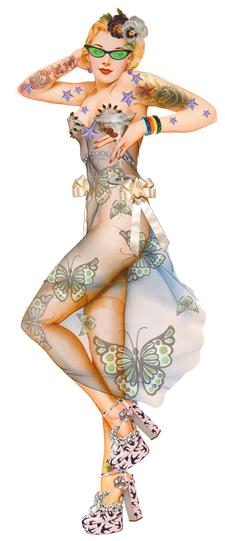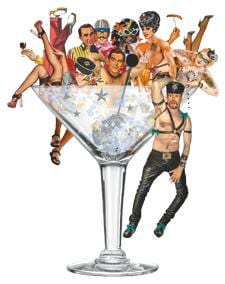
Credit: Illustration by John Webster
Vancouver’s newest club is reviving one of the most hotly contested debates within the gay community: stick to our own gay spaces or mix with straight people?
“I love the idea of a mixed club,” says 23-year-old Ryan Clayton, who speaks about homophobia in schools. “I think that’s great as long as the gay spa-ces are also preserved as a safe space.”
Gays need their own spaces because homophobia persists, he says. “I’d love a world where we can all get along and play together nicely, but I think the reality is we’re not in that world yet.”
Though gay-owned, Five Sixty does not bill itself as gay. Nor does it call itself straight, either.
Vancouver’s hottest new club, which opened to the public on March 27 at 560 Seymour St and got its liquor licence from the straight club Richard’s on Richards, which closed last year, considers itself “mixed.”
This does not sit well with some veteran gay club owners.
In Victoria, Gary Penny is adamant about maintaining gay clubs.
Penny fumed after he sold his last gay club, Prism, and the new owner made it mixed, leaving the city with no explicitly gay clubs. So he came out of retirement at age 68 to open the gay-only Cooper Club, whose website boasts that it’s the “city’s only Gay Nightclub to feature Hot Male Dancers!!!!”
By integrating into mixed clubs and abandoning gay-only spaces, gays become more of a minority, Penny warns.
“I think they’re going into dangerous waters if we keep integrating and don’t have a few spots,” he says. “The Jamaicans know it. Latin people have their special nights. The Sikhs have special things. And gay people should have a place, too, don’t you think?
“For the people that accept a mixed club, that’s great,” he says. “But at the same time, I see gay clubs closing left and right.
“Where’s the gay community in the West End anymore?” he asks.
Once home to many gay bars and clubs, Vancouver’s Gay Village has seen several establishments go mixed or even straight with special gay nights since the late 1990s. Today, Celebrities and Oasis seem to be gay part-time. Sugar Daddy’s turned into Score, which merely bills itself as gay-friendly. The Junction Pub, formerly Pulse, touts on its website: “Expect to get down with those that are straight — not narrow.”
While event producer Terry Costa hopes Five Sixty succeeds, he laments the loss of gay clubs on Davie St.
“We should definitely not lose the little bit of gay spaces that we have,” he says. “There are very few, and it’s much easier to lose them than to gain a new one.”
Jeff Guaracino, author of Gay and Lesbian Tourism: The Essential Guide for Marketers says gay-only clubs and bars not only attract gay tourists but also help them meet gay locals and find out about the city’s queer offerings, a function mixed clubs cannot offer.
“If you have a mixed bar, visitors aren’t quite sure where they’re going,” Guaracino says.
The transition of some bars from gay to mixed is a sensitive topic. One party promoter for Celebrities abruptly ended an interview for this story.
But mixed clubs have been around Vancouver for decades. In 1976, Luv Affair opened as a gay bar and eventually became a mixed club, about 70 percent gay and 30 percent straight, says Phil Moon, who owned the club and has owned several others, including Numbers.
Good memories of the club have been passed down even to people born after it opened. “A lot of people talk about it with fondness,” says 25-year-old Sylvia Machat.
In his 20s, Vincent Alvaro, Five Sixty’s owner, had a love affair with Luv Affair, enjoying the drag queens and gay staff and DJs.
“It was definitely the first club in the city where you would see gay and straight people dancing on the same dancefloor,” he says.
So in 1986, he opened Graceland on Richards St, a 30,000-square-foot club modelled after Luv Affair. In a light industrial area, the club had no sign and its entrance was on a loading dock in the back of the building, giving the club an underground feel, Alvaro remembers. Its staff and crowd were evenly split among gays and straights and the club hosted several gay events.
Men would come with their girlfriends on the mixed-crowd night on Saturdays, and some would return alone on the Tuesday gay night, he says.
The mixed night “gave them an opportunity to not be threatened in a gay environment,” Alvaro says.
Closed in 1990 after a dispute with an investor, the only remnant of the club is the name of the condo, the Grace, built on the lot.
“Since Graceland closed, nothing opened to fill that void — until this [Five Sixty],” Alvaro says.
Gays and straights share Five Sixty’s dancefloor, mix in the lounge and relax with drinks in the second-floor art gallery of the 30,000-square-foot club. The basement, a combination of washroom and dancefloor with a DJ, is popular with the gay crowd, Alvaro notes.
He says a lot of people seem to think Saturday is gay night. But it’s just half gay, he says, pointing out that he marketed Five Sixty as a mixed club from its inception by hiring many gay staffers.
Lola, the bartender in the basement, has been a fixture in gay nightlife for decades, working at Graceland and most recently Odyssey. The club also has lured staffers from 1181, the Junction Pub and Delilah’s. And Simone works the door and will immediately admit any gay people waiting in line, Alvaro says.
The club opened with gay icon Honey Dijon, who may return monthly, and Five Sixty will host special events, including gay Pride, he continues.
“I think gay-only clubs are still a good idea,” Alvaro says. “There’s obviously a need for them. But there is also a need for mixed clubs where gay people can go out with their straight friends and straight people can go out with their gay friends.”
Five Sixty will also require a mixed clientele because the gay community can’t support a club seven nights a week, Alvaro points out.
Vince Marino, who co-owns the PumpJack and Junction Pubs, says the question of losing our gay spaces has come up before. But he says mixed clubs are a good idea.
“Isn’t that a reflection, I suppose, of where the gay community wants to be?” he asks.
Drag queen Cotton, aka Michael Venus, who works as a promoter for Five Sixty, says gays in a mixed club can help liberate straights.
“I’m a symbol of like, ‘Hey, it’s freedom. You can dress however you want. You can be whoever you are,’” he says. “And we’re sort of teaching the masses that. I think that’s really important because it’s good to have your gay spaces, you know women’s clubs and women’s parties, men’s parties and all that stuff. But at the same time, we can’t be sheltered. We have to sort of be free in this world. This is our world, too.”
DJ G-Luve agrees. “By having these mixed clubs, there’s more educating. It’s saying ‘Hey, this is a new time. This is a new era.’”
But some say the existence of mixed clubs shouldn’t fool people into believing the straight community welcomes gays and lesbians with open arms.
“I tell my students that no one would make that statement that because we go to jazz clubs in Harlem obviously everything is fine between the races in America,” says Vicki Eaklor, a history professor at Alfred University in New York and author of Queer America: A GLBT History of the 20th Century.

 Why you can trust Xtra
Why you can trust Xtra


